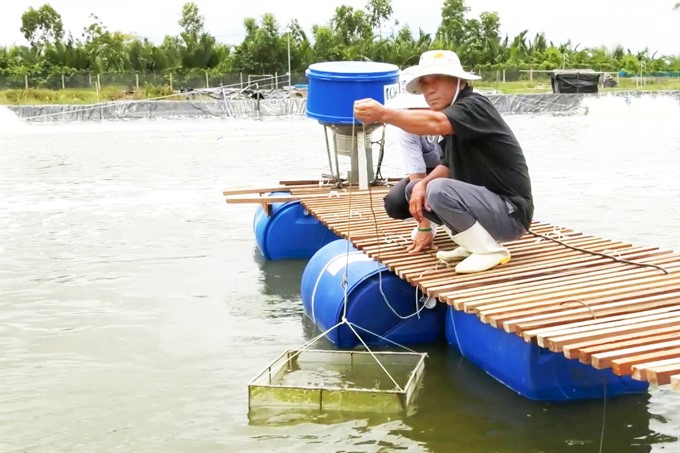 Economy
Economy

Shrimp farms in HCM City are forced to sell their products to traditional markets despite achieving VietGAP standards since they cannot meet local supermarkets’ commercial conditions.
 |
| A shrimp farming pond in HCM City’s Cần Giờ District. — VNS File Photo |
HCM CITY -- Shrimp farms in HCM City are forced to sell their products to traditional markets despite achieving VietGAP standards since they cannot meet local supermarkets’commercial conditions.
Supermarkets in the city want them to supply only 20kg a day while the breeders say all the shrimp in a pond is harvested at the same time.
Thus, they have to sell their shrimps to wholesale markets or agents who buy all the crustaceans in their ponds regardless of size and weight.
There are no semi-processing plants that would help the farmers keep their shrimps for a long period without fear of spoilage.
Nguyễn Thị Kim Dung, chairwoman of the Nhà Bè-based Hiệp Thành Cooperative, said since the co-operative has no office and scarce resources, it cannot support members when they encounter difficulties, especially financial.
HCM City has two large shrimp breeding areas: Nhà Bè and Cần Giờ districts.
Nhà Bè has 238ha of shrimp farming ponds, which produce 1,400 tonnes a year.
Cần Giờ has 5,500ha in the communes of Bình Khánh, An Thới Đông, Lý Nhơn, and Tam Thôn Hiệp, and has an annual output of more than 10,000 tonnes.
According to a report from Cần Giờ District People’s Committee, two years after it was set up, the co-operative has 13 members who have 26.7ha of shrimp farming ponds and harvest 12 tonnes a year.
A member, Trần Văn Mùa, said the co-operative has never used antibiotics in breeding shrimps.
With support from the HCM City Department of Agriculture and Rural Development and other official agencies, the co-operative’s farmers have achieved VietGAP standards.
Yet they find themselves unable to sell to supermarkets and get reasonable prices for their shrimp.
Cần Giờ has 63 processing facilities with a total capacity of 2,500 tonnes a year.
According to the district People’s Committee, these are traditional facilities which have neither registered their trademarks nor use modern technologies.
Võ Thị Mộng Thu, head of the city Department of Agriculture and Rural Development’s aquaculture division, said her agency would help Hiệp Thành Cooperative register its business at the Nhà Bè People’s Committee. —VNS.




